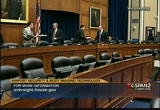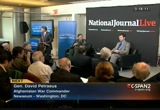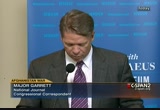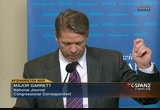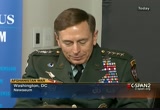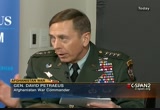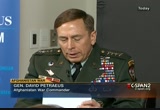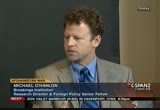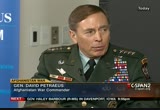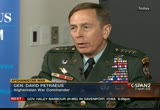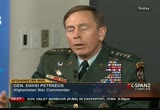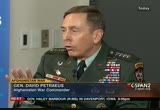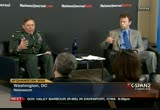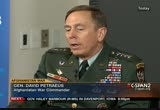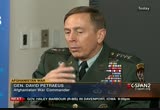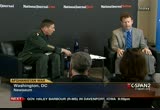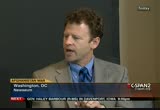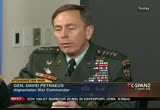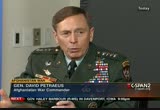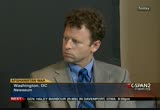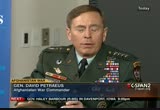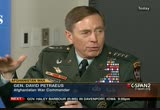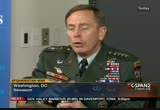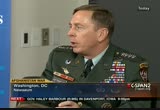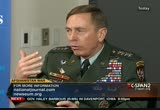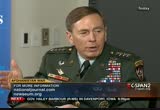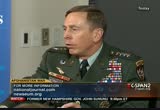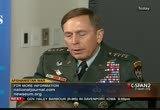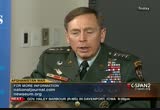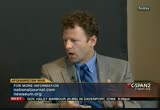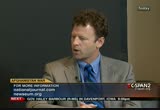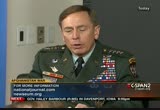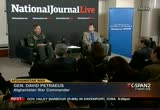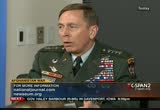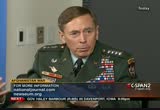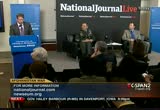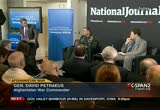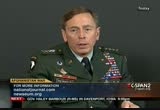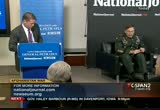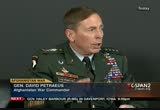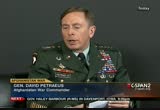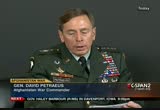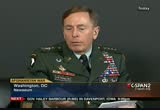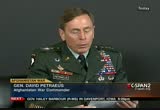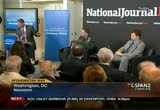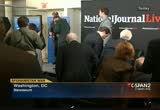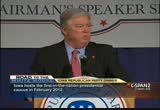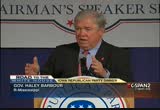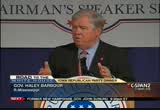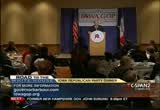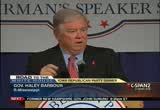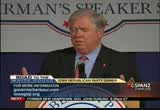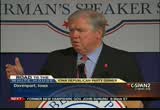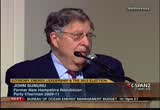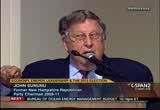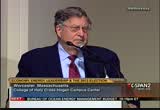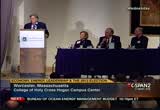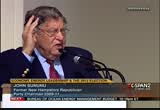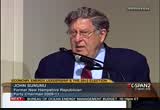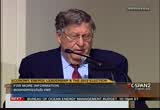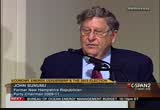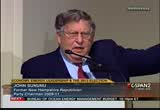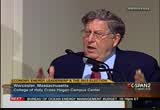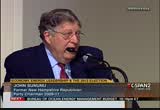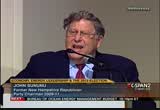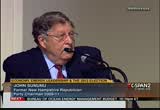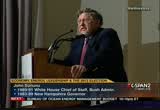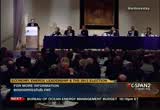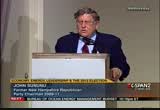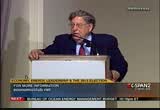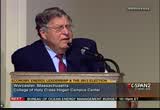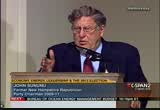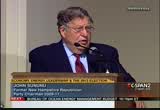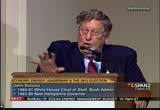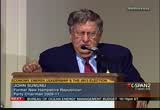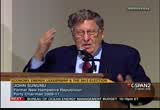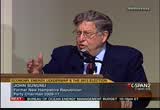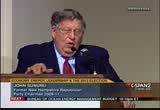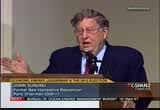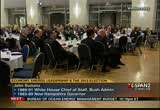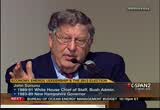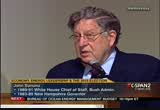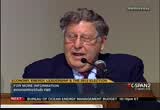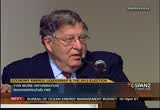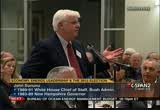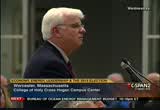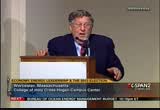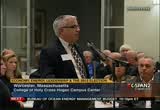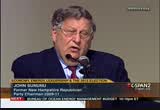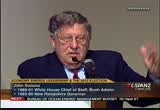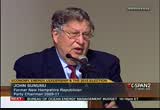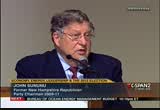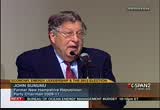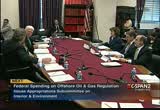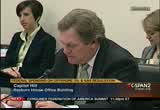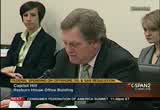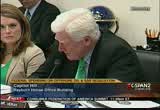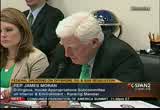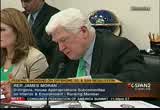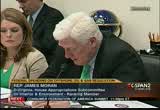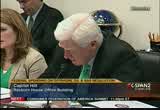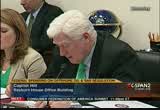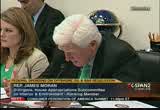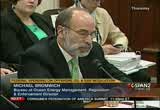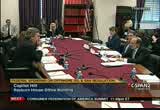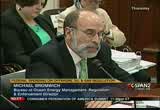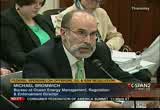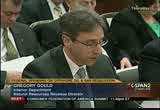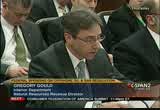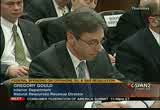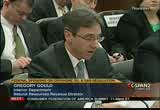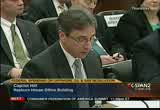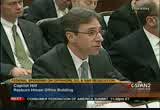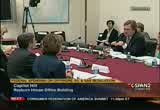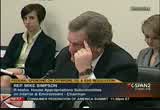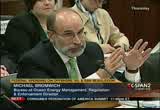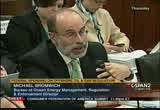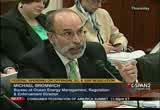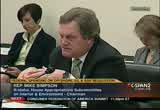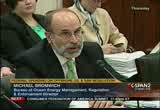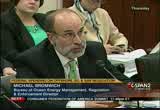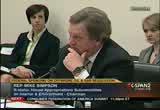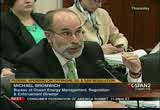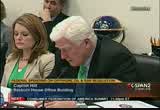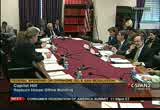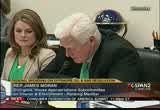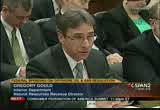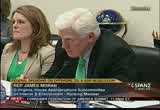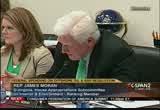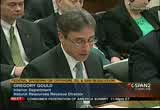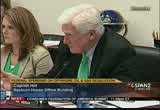tv Tonight From Washington CSPAN March 18, 2011 8:00pm-11:00pm EDT
8:00 pm
[inaudible conversations] >> tonight on c-span2, the commander of allied forces in afghanistan, then mississippi governor, his the barber makes an appearance and i what. then john sununu. one of the suspense public affairs offerings, weekdays live part of the u.s. senate. weekends book tv, 48 hours of the latest nonfiction books. connect with us on twitter, facebook, and youtube and kind up for scheduled alert e-mails.
8:01 pm
>> general david patraeus said today that he did not think u.s. participation in a no-fly zone over libya would have an impact on assets for fledging -- fighting the war in afghanistan. in remarks at a forum hosted by national journal and the museum general patraeus also reiterated his support for the obama administration's july 2011 date to begin the drawdown of u.s. troops. general patraeus has been and washington to report to the president and congress about the state of the war in afghanistan. his first visit since taking command of the war effort there last summer. this is an hour. >> i want to welcome all of you here. i see that we have all survived st. patrick's day which is very good. probably the first day of the ncaa basketball tournament. my bracket has been shredded. i want to thank the museum for hosting this event and providing the facilities for us here at the national journal for our conversation. eyes only want to thank person
8:02 pm
late general patraeus and his team to helping us build this event and a special thanks to the ceo of the museum who is not here, but we are indebted to him and the museum for providing the facilities and the arrangements to carry this off. another special thank-you to steve clements of the new america foundation. we thank you. this is a ritualistic thing that we do in washington, but it is important. please silence your cell phones, iphones, and every other electronic device so that we don't interfere with the a lot -- conversation. you have the ability to bring your own questions to general patraeus to be the national journal staff will circulate taking questions which will then be filtered -- not filtered, but applied on a. [laughter] you know, -- >> you said filtered earlier. >> as you can tell, i did not survive st. patrick's day intact. they will not be filtered.
8:03 pm
they will be put into an ipad which i will then quite elegantly used letter in about a half-hour, and we will have those questions and mine for the general after the first half-hour which will be led by michael lohan and. again, no filtering. if you want to, and are so motivated and our twitter savvy, as this conversation continues we encourage you to tweet what you are observing and how you are taking this and at the hash tag. you know what that is. in the j patraeus. i would like to turn this over to our moderator he does not need an introduction. take it away. >> thank you, maj. [applause] is a tree to be here. and now that we all share. just a great honor to be with you. thank you. all the men and women in uniform. all of the family spirit that me say a brief word of introduction
8:04 pm
about general patraeus, and we will go straight to major conversation. that me say a brief word of the second half hour, we will take all of your ideas and thoughts and questions. a 1974 graduate of west point. he also, of course, had many positions and commands and distinguished honors along the way. 1983 he won the george marshall award at the army general and command staff college and then went to princeton or i had the pleasure of getting to know him in bad school and did his ph.d. in about two and a half years to know which was less than half as much time of any of the rest of us and continues to be a princeton record. professor patraeus then spent some time teaching, and many of us now most of the story from that point onward. i would just remind you that depending upon how you count europe he is in his seventh deployment including deployment in haiti, bosnia, three deployments in iraq, and his
8:05 pm
command position in afghanistan. on top of that let me mention a couple of the awards he has one, many of familiar to you. the defense distinguished service medal, bronze star, and when you may not have heard of, the gold award of the iraqi order of the de paul. and so we have seen a number of accomplishments in this young man's career. in two dozen seven he was a runner-up for time person of the year. i'm still not convinced anyone had a better 2007 demand we are all grateful for what he accomplished and what he's doing now to be out want to conclude this introduction in a way that i think is appropriate. all of us would agree to take his family, his wife and children and all of the military families and around the country. please join me in a proper will compare general patraeus. [speaking in native tongue] [inaudible conversations] >> thank you for the kind words and introduction. thank you to all of you for being here instead of the to
8:06 pm
your tv screens to see what happens in libya or any of the other areas around the country. it is a privilege to represent those great men and women that you talked about here today. with respect to the time that it took me to turn my phd at princeton i heard that mike was going to do it in less time. not that i am competitive or anything like that, but i decided to step up the pace. earlier i did want to be reassured. i have done a handful of presentations here. i want to thank museum for pulling this together and getting such a wonderful audience. i did want to be reassured that there is no serving military officer who has done more presentations that i have. i am assured that the record is the mine. i will continue to try to defend that particular title.
8:07 pm
it will be interesting to see today's people fielding twitter and on ipad and everything else. i do want to assure you that i do have reinforcements ready in the form of power point slides. you know the deal. that is one of the first amendment rights of every four-star u.s. army general, a little asterisk on the bill of rights. i was, as i looked at the audience coming year, and it really is an impressive group, i was reminded of a moment a number of years back. i was a young major working on temporary duty for the then commander in chief of those days of the u.s. southern command he some of you will recall went on to be the supreme allied commander of europe and was then dean at the fletcher school of law and diplomacy in the mid-80s. we had engagements are ongoing in el salvador, colombia, peru, and a variety of other places in central and south america.
8:08 pm
really quite an experience for a young officer. in fact, i learned a great deal format. relevance to this event, as we drove over here i remember watching his interaction with the press, and he was really quite skillful. i remember one day in particular watching an especially lively press conference. when it was complete and the board walking to his vehicle he said, what did you think? i said, well, sir, you know, it seems to me that you got all your points across, but, frankly, you never answered a single one of their questions. he responded, they didn't ask a single one of mine. i am sure that will not be the case today. again, i look forward to conversations with a great princeton colleague, the man who i think has to have the record for the most sense 911 and has appeared on television by anyone's account, i think 2,000 times and counted.
8:09 pm
so it is great to be with you again, mike, great to be with all of you, and he has been in afghanistan more recently than i have. he just got back one night ago. and so we will asking for updates as well. >> book, thank you. i want to begin with i know a lot of people are very concerned about the afghanistan war. you inspire great confidence in your presentations. yet i know people are worried that this has become our longest war. i want to take off with my first question. he joined the military during the vietnam war, but your dissertation about some of the lessons of vietnam. i don't think afghanistan is vietnam, but i would like to invite you to explain to the crowd why it is not at time when we are now nine years calling on ten years and when secretary gates and the speech in brussels one week ago seemed to suggest we will not withdraw any cheers
8:10 pm
the summer and reminded our european allies that they should be more interested in accomplishing mission objectives. wanted to ask you to comment on why this is not becoming a quagmire. i don't think it is, but i know a lot of americans have that concern. i would like to give you the opportunity to respond. >> first and foremost at think that there is very little argument about the truly vital national security interest that reside in afghanistan and, of course some of the greater afghanistan-pakistan regent. the fact is that there is no question about why we went to afghanistan. it is because of september 11 and the attacks planned in the camps in afghanistan at the time of the town band control. the initial training of the attackers took place in training camps before then moved on to hamburg and u.s. by schools. we went there because of those attacks.
8:11 pm
really our core objective, again, if you narrow it to afghanistan, is to insure that afghanistan does not once again become a sanctuary for alkyne that or some other would-be transnational extremism command the region does have other groups that are certainly have aspirations in that regard. beyond that i think it is important to recall, as i did explain on capitol hill. you know we had a total of about ten hours of hearings. to open hearings and then the senate foreign relations committee behind closed doors and also met with the top four as well. one of the themes that i really sought to of stress was that it is only recently that we have gotten the input right in afghanistan. secretary gates, as you know, three phases. the early phase that we got right. the country's impressive work. and then over time we took our
8:12 pm
eye off of the ball and focused on other issues on a rock. that during guy called patraeus that wanted all the resources. and then, of course, we can back to afghanistan as we started to get the situation into a reasonable place and got it on the glide path. when i took command of central command coming out of iraq in late 2008 at the end of october and looked at afghanistan and have very, very deliberate manner it was clear that we did not have the organizations and plays necessary to carry out a comprehensive civil military counterinsurgency campaign. we learned what we needed to do. we were not stacked properly. we did not have the resources that we needed. since then we have added some 87,000 nato troops forces. we a triple the number of
8:13 pm
civilians with additional funding for afghan security forces commander did not have all of the cause of stride. we did not have a civil military campaign chant, a reintegration strategy, a tactical directed to reduce civilian casualties. these conceptual underpinnings for the kind of campaign that we needed to conduct. the bottom line is that touch achieve our core objectives. afghanistan that does not have an extremist transnational extremist sanctuary. only one way to do that. that is to help afghanistan governance of to an adequate degree. we are not trying to turn the country into switzerland. the only way to do that is to carry out a comprehensive civil military counter insurgency campaign. comprehensive approach. one that is not just kinetic activities, but also includes substantial support for the
8:14 pm
various civilian organizations that are helping afghanistan build the local governments conventional and national governments and to get the economy at those different levels moving as well. we, again, only got that right about six months ago. the serious study and the final months of the bush administration, the two reviews in the first year of president obama's administration, and the decisions out of those have provided the resources that we needed and then we have worked very hard with the various commands to build the organizations that we know are required. you know, but did not have a reintegration cell. if you don't want to kill or capture every bad guy, you have to figure out how to reintegrate the reconcilable. we did not have an operational level headquarters, the sufficiency, robustness. all of this in a country that
8:15 pm
although the perception was that we were winning for quite a long time, the truth was that the telegram was regaining momentum from at least 2005 and perhaps even a bit earlier. the fact is i was asked to go through afghanistan on the way home from a second tour in iraq. fifteen and a half month. ask me to come home from afghanistan. we have a variety of suggestions and so forth. it included a power plants lie that was titled afghanistan does not equal barack and laid out all of the differences. then the bottom line, i owe it to you to give some broader observations as well. i said, the bottom line is that my view, afghanistan will be the longest campaign in the war. that did not elicit, you know,
8:16 pm
wild applause from the third floor of the pentagon because at that time there was a perception well into 2007. remember sitting in iraq wondering why i had not taken the afghan job when i had the chance. that was the war we were winning going away. the truth was it was already starting to spiral down. the television were already reestablishing safe havens, and it's only in the last six months that we have taken away from him this very important safe haven. home town west of kandahar. then the very important areas of central helmand province that were the next between the taliban, the command and control and the illegal narcotics industry. certainly we have challenges. there was an unfortunate reference to government. it turned out not to be. interestingly in the first of march this year there was an election for district committee
8:17 pm
counsel that followed a very spirited and raucous debate and 75% of the registered voters cast a ballot and now have a committee counsel. they have a good district governor as well. that is generally true because of the other districts, although there is no question that there is serious fighting to be done there, particularly as we push for the north. well, thank you. i was going to try to probe in a little bit on a couple of big issues. one would be, the afghan government and security forces and how they are coming along. i'll ask you about that in the second, but i'd also like to ask about pakistan. the first question, of course, we tend to personalize the afghan government a lot in the american debate. i was fortunate enough to see him on monday. you obviously see him a lot. he is a person that strikes me
8:18 pm
as, you know, frustrated with the length of a war, like many americans. emotional about the state of play, but i don't want ask about president karzai, but all of the other afghan leaders to deal with. in the military and police force and cabinet, maybe invite you to explain to all of us a little bit more about what you see in terms of the metal to market reformers, good people, and one specific additional point, on the afghan security forces themselves, you mentioned in testimony that they had done a lot. you quoted a figure of 60 percent of the combined force being afghan for some of the operations. can you tell us a little bit more about test how well they are fighting and just how well the is coming along? also note just how well their ethnic balance is working because some people are concerned about tensions as well. >> first, the ethnic balance is an easy answer.
8:19 pm
that is that it almost mirrors the country in terms of percentages. it is about 42% of the army. 42 percent. but there is a challenge, and that is that the insufficiency in other parts of the country. and so they have actually had a very active recruiting campaign to try to fill that gap and have done reasonably well in getting hundreds per month from the southern provinces which is a considerable increase. it also reflects, frankly, the fact that security has improved to the point in certain districts as hangman can raise their hand, join the military, and not end up with their families killed or kidnapped or intimidated. that is positive as well. with respect to the government, the senior ministers by and large are very impressive. the vast majority of what would be turned technocrats in that part of the world. most of them are western educated with pcs. again, very impressive
8:20 pm
individuals. many of them are, indeed, reformers. you have to operate within a political context, as does president karzai and ask asked -- afghanistan. there is a perception that he is omnipotent. the executive branch is all-powerful. it is given very considerable powers compared to most other democracies by the constitution, but the fact is that he has to maintain a political foundation that must include, for example, his first vice-president, and of an alliance. the second vice-president, he is constantly having to shore up his political foundation which consists of considerations for both ethnic and sectarian dynamics in the country and then you get into the tribal aspects of it as well. so that does and has since put right and left limits on the road forward for what that they can do in certain respects.
8:21 pm
the senior leaders, quite impressive. the challenge, and they will be the first to tell you. president karzai will be the first to tell you, the challenge is the human capital in the institutions themselves. then the challenge of criminal patronage networks to those institutions as well, which he is very forthright about and really does want to deal with. with respect to the human capitol, you have to remember that this is a company that has suffered 30 years of war. when it started it as one of the three or four poorest countries in the world. the human capital left the country. it's understandable, or went to work for ngos or what have you. then there has been an attraction back of a number of these individuals, but not enough to populate the large institutions, large ministries to the extent that is necessary by any means. there is a challenge with we call government a capacity, particularly when it comes to budget execution.
8:22 pm
what is a military commander concerned about, budget and execution. i have a long conversation about that. i am concerned about it because if we can't get better -- better budget execution as he put more money on budget and remove the parallel aestheticians that you rightly and understandably expressed reservations about because they're doing what government should be doing, well, and he put it in on budget it won't get out to the people. basic services will be there. he is very seized with this, as is his minister of finance. they are, indeed, going to do all that they can in the years that lie ahead because this is the key to building institutions to which we can transition very important tasks for the afghan people. now, another issue. that is this challenge of what he and i have agreed to call criminal pictured it now works, individuals who are crooks, breaking the law, enjoy a degree
8:23 pm
of political protection from various elements in this political firmament fed is out there. they are not acting as individuals, but parts of networks. in an example, this was the surgeon general who fired after hearing what this individual was to win, which was just really immoral, not just to illegal. stealing drugs, selling them, and replacing them with counterfeit. this kind of activity. as this was laid out for him as a result of a isaf / after an effort he fired him on the spot in his version of the oval office. he stuck to it even though the individual had considerable political support in certain corey's. he then fired the chain of command of the national military hospital. there are other cases. there will be big tests. the resolution of the kabul
8:24 pm
bank. the satisfaction of the imf, which is used important. you have to get the imf program going. these are all important efforts in the months and years that lie ahead. the reason that he was seized was to some degree these or organizations that were owned and operated by important individuals, some of them former warlords, justifying keeping guys with guns and pays their salaries. we were contributing to this. he saw these readily as competing with the government security forces that will be needed to take this country forward. and so, he was right to do that. we now have a solution as of two or three days ago to take that issue. it is resolved and we will take one year. there is not pause for diplomats
8:25 pm
and so forth. with respect to the afghan national security forces, they have, indeed, ground, not just in quantity to 70,000 in 2010 alone, but in quality. i don't want to overstate this. this is, again, a hugely challenging. we jokingly talk about it being like building the world's largest airplane while in flight while it's being designed and while it's being shot at. it is very, very difficult. you are building institutions, not just battalions. we are way past the point of building and and tripped italians to help in the fight against the insurgents. this is about building branch schools and centers, building a so-called enablers, building logistics' comments, artillery, armored, aviation, fixed-when andrew 3-ring, military intelligence, military police, transportation, all of these are necessary. this is why we judge none of these units effective
8:26 pm
independently yet because although they have improved in quality as units because they cannot yet sustain and support themselves. that is the focus of this year and next year. there is unevenness without question. there are still challenges with some of the elements. you will recall one reason that marcia was taken over is because there was frustration with the police. they were pregnant preying on the people. so there is no question that integrity and a culture of service has to be inculcated in these forces. some of the u.s. have really truly grasp this very well. others, frankly, still have more work to do. i can assure you that the of the military, the minister of defense, the chief of general staff, very, very serious about this. the emmeline personally has replaced dozens of senior
8:27 pm
leaders and hundreds of lower level individuals. in general because they were either incompetent or a relative terms, an effective or in some cases because they were corrupt, carrying out corrupt activities. so, you know, there has been a lot of discussion about july 2011. i often noted that july 2011 was a massive -- a message of urgency. complemented ended december 2009 speech at west point that message of enormous additional commitment. i don't know whether it was inappropriate complement. it did coming in fact, create a sense of urgency. when you have the lisbon agreement, afghan forces at that point in time sustaining substantial commitment by national leaders as the troop contributing nations which complemented july 2011 and took
8:28 pm
the, you know, concerns that people might have had that july 2011 was heading for the exodus rather than being the beginning of what president obama has turned the responsible drawdown of surge of forces at a pace determined by conditions on the ground. again, that gives you some sense of the government, challenges in building capacity, which i think will be the biggest of the challenges in the years that lie ahead. again, if we want to achieve the couple confidence commitment from last year, 50 percent on budget, there has got to be a much greater budget execution capacity. as i said to my also had that conversation at some length with the minister of finance together with embassy representatives before heading back here because it is so important. and, as i said, the military and police making strides. general caldwell and his team have done truly marvelous work in many areas, including, by the
8:29 pm
way, finally biting the bullet and doing something that we probably should have done years ago which is recognized that we have to help with literacy training for the soldiers and police. it is not enough to train someone to shoot a weapon if he can't read this serial number of the weapon or to train a policeman in his basic patrolling duties if he can't read the license plate off a vehicle he is supposed to be looking for. we bet that ball at about six months ago. now the results on that i think it is over 50 or 60,000 have completed. when they get basic military or basic police training they also get basic literacy training. yes, it gets them to a first grade level, but as they get to the for stage and noncommissioned officer the development they get the third grade and it continues on. then you get to the higher levels and the afghan national military academy. there were over for applicants for every single slot. a hugely competitive. by the way, they did the admissions process this year by
8:30 pm
numbers, not by names. there can be no linkage. this individual is connected or he is part of this tribe of that tribe. that doesn't -- that is not possible. and finally, by the way -- i mentioned this on capitol hill. the way ahead for afghanistan clearly has to include, again, the development of human capital. the biggest contribution to that is, of course, basic education and it is a very heartening to see that this year there will be over 8 million afghan children and schools compared with less than 1 million over -- under the taliban and some 37% of those according to the minister of education will be girls compared with a minuscule percentage under the taliban. >> i have been told i have time for one last question. abel g. and package to into one. i have a followup. the follow-up on the afghan
8:31 pm
forces. a well-known book. essentially alleging the afghan security for kids don't fight. i want to put that lonely on the table. in addition to the institutions, do they really fight? >> let me just do that. they do fight. what is the best measure of that? is a macabre measure, but it is that they die. they fight and die for their country at higher numbers than our trips, considerably higher numbers. beyond that actually won i often get asked. okay, general, one of the afghans step up to the plate and take the lead somewhere? ..
8:32 pm
it's a very, very different atmosphere. yes there are periodic sensational attacks but the iroquois periodic and kabul has had a serious period about eight months it has been quite good by the standards and it is afghan forces, afghan police on the streets that's the face of security. it is afghan soldiers further out than the other and afghan special mission units on the street every single night conducting on average two to three targeted intelligence driven operations which are to be sure assisted by intelligence
8:33 pm
surveillance and reconnaissance platforms from u.s. military come some partner elements or intelligence agencies. but it is afghan forces during the mock on the door going over the wall and conducting the actual operation with some assistance again as i said in a relatively small numbers typically. >> let me ask pakistan and i missing some of the audience may follow up on the subject. in your testimony, you i think appropriately acknowledged the efforts of the pakistanis have made in recent years against their own taliban and dealing with the tragic flood last year and so forth. but i also was struck and glad to hear your tone regarded hopefulness about what they might do next in terms of dealing with the sanctuary's and the taliban parts of the afghan insurgency and i found myself hoping you are right, but wondering how much you worry about the counter argument which would be the afghans to
8:34 pm
effectively kept the same jury is operational for their own reasons which they may not have backed away from. we are not going to get the job done well enough in afghanistan and they want a backup plan and so it's not to india friendly of a government that might come afterwards or perhaps they are in a more aggressive way trying to exert leverage over president carter's i and have a hand in any negotiations he made ultimately carry off with the taliban to make sure they are power brokers. how confident are you pakistan is going to step up the game this year and next against the sanctuary is on its territory? >> first let me start by saying that i think the to think you hit the key point, and that is very likely among the most important ways to influence what happens over time in pakistan is to continue to make progress in afghanistan because if there is hedging events as you say in the various debates about this and that it is because there's an
8:35 pm
uncertainty how afghanistan will turn out and it's understandable pakistan should want to be, to have reassurance that the country to its west, given how narrow pakistan is in particular which has often been seen as the strategic debt for pakistan relative to something happening from india that that country is not again a proxy for india or something like this, so it would be not just peaceful and stable but it would also not be -- and would be a friend of pakistan rather than antagonistic and i think that's important and it is a reasonable desire on our pakistani partners. it is important to note what they've done over the course of the last two years. let's remember to years ago i was a central commander and i remember an enormous challenges. their economics reserves were
8:36 pm
running down. i remember talking about as the price of leal was spiking if the winter of 2008 and other commodity prices were going up, believe it or not i went to the world bank and the treasury as a combatant commanders because i was worried that this had security implications. then all of a sudden that got sorted out but then you had the taliban pakistani which had taken over the valley and what was called the northwest frontier province and several of the agencies of the federally had mastered tribal areas and they have lost thousands of soldiers and also thousands of civilians in a very impressive counter insurgency campaign. again, to clear swot valley and the other areas of what is now called kuiper to deal with the same and advise your agency and sought waziristan or others. this has been very tough. they have moved a lot of forces to focus on this effort and have
8:37 pm
increased by at least one-third of the forces that are out there and taken a number of courses for this kind of combat and they've done it very impressively and sacrificed a great deal. having said that, there is no question they will be the first to tell you there are other groups that are causing problems in the region and do over time have to be dealt with. the fact it is important is a campaign in north waziristan that is putting enormous precedent it pressure on the al qaeda stand jury there and again that's a huge set the toucans to our partners and allies in europe and to the homeland. but again, there are these other areas, and i think that we have often talked about how over time pakistan does seek to come to grips with this dynamic and
8:38 pm
remember by the way we fund these groups in the beginning this is how we got rid of the soviets from afghanistan and then in the week of charlie wilson's war we left and we should remember we have seen this before. what happens if you disengage? but there are these groups and this is the conundrum of allowing poisonous snakes to have a nest in your backyard, the task of understanding they are going to bite the neighbors' kids but sooner or later the bite yours and that is how the pune job taliban has -- and so there is a very worrisome development where the youth from the settled area are being radicalized in the troubled areas and this is a kind of challenge in addition to of course the various political social and economic challenges pakistan faces. this is the kind of challenge the are working to come to grips with. we have close relations with general chianti.
8:39 pm
i met him twice in the last four weeks alone for example, and we are working more closely than ever on a coordinated operations on either side of the border so that if they do an operation against the taliban pakistani postured if they come across the border as they did by this past winter and killed a couple of dozen of them who were fleeing the pakistan operation as we conduct operations on our side we work hard to coordinate those they know if we are going to be near the border in the same in the south as well and there's a recent operation down in the area of helmand province that is very important because there was a displaced safe haven nexus of the taliban and evil narcotics industry no longer in operation. >> major come over to you in the crowd. >> general i'm going to ask you to do something you're familiar
8:40 pm
with. i'm not going to treat this as a lightning rod for but for the confidence of the crew -- i noticed something about that but -- >> some of these questions are very good and you're going to want to get to as many of them as you can because they are hungry to have these asked and most importantly for you to answer them so let me start with one thing you said on capitol hill this week this is my question. you sit combat troops could be included in the july 2011 withdrawal timetable. will they be included and what number and if not a sufficient number to convey the american people that this operation does have a foreseeable ending point would that not undermine what the president promised the country in december 1st, 2009 at west point? >> would you like the specific unit designations as well? >> as specific as you are prepared to be. >> as i explained on capitol hill i literally in still developing the options. i'm giving it with a very, very
8:41 pm
small group of individuals. there's only two other people on the headquarters participating in this and i will deliver it personally to my chain of command and then on to president obama. we have a variety of criteria if you will by which you then assess the different options we will provide to them in the course of them leading to the recommendation. i have not yet finalized with the recommendation will be, with the numbers will be. it is likely that there will be combat forces in each of those options, but again we are still working our way through that and we haven't finalized that. >> most recently 64% of americans surveyed in this country do not believe this war is worth fighting. why are they wrong? >> well, obviously i was struck by that. i did say on capitol hill i'm not here to sell the war. i'm here to report forthrightly on the situation on the ground and i think that's the
8:42 pm
responsibility of the military commanders. but clearly you have to be aware of the strategic context and obviously domestic public opinion is a very important element of the context as it is by the we in the other 47 troop contributing nations of the nato force. so it is a concern. i think in both under-secretary flournoy and i tried to remind folks of this i think it is important to recall again, why we went there and why we are still there. as i mentioned up front, to remember that it is a vital national security interest, that the transnational al qaeda and other transnational extremists not able to reestablish the sanctuary in afghanistan as they had prior to 9/11. >> one of the questions is afghan a tough one country that is to you have reasons to be the fourth year the social political changes you are instituting will not remain after we depart?
8:43 pm
>> first of all we are not about the social and political change. we are doing is helping our afghan partners develop what is right for them and that is our goal. we often say as well i actually remind the troopers this isn't about winning the hearts and minds for us. we'd like to have the hearts and minds. to become everybody likes to be left but what matters is the hearts and minds for the of ken partners so we can transition to them so they are seen as legitimate in the eyes of the people. that is the true measure of success and that's what we are trying to do. we are supporting certainly the development of institutions and afghanistan. it literally evolves. there are countervailing forces. a lot of people on capitol hill including speaker pelosi spoke about women in afghanistan and ensuring that there is and backsliding. i pointed out to her that there
8:44 pm
is 18% greater number of women in the afghan parliament than in the u.s. congress to be sure because there is constitutional requirement for that. but that does exist. i mentioned already the greater access of elementary school for afghan girls, the same is true of secondary and college education. it's a conservative country in the rural areas and those tenants are going to pull in different directions. our job is to support our afghan partners not to try to troops who need them. >> do you think reconstruction teams are effective and properly resource? president karzai went to disband them and agree. >> i do agree. he's right. parallel institutions to have to go away. but of course they have to go away when afghan institutions can do the important work of the provincial reconstruction teams are doing for the afghan people
8:45 pm
together with a variety of other international governmental organizations. usaid very prominent. >> we have two questions along this line i want you to address. what is the nature of iran's role in afghanistan? is it entirely malignant or are there opportunities for cooperation this? >> yes, let me answer that. i think what you see with iran and afghanistan is a degree of conflict and almost by the clarity. you have on the one signed the security services of iran which have of course been greatly strengthened in recent years as a result of the supreme leader having to turn to them in such a significant way to put down the riots and demonstrations in the wake of the hijacked elections a year and a half ago. and so you have these security services, the revolutionary guards quds force foremost among them providing training, equipping funding and so forth
8:46 pm
to the afghan taliban, and of course we publicly announced the seizure of the 48, 122-millimeter and rockets just across the border in southwestern afghanistan after they were seized in the joint special operations. it wasn't a coincidence that we were there and it wasn't a coincidence those elements were there. the rockets are more than double the range of the 107, double the payload is that is a concern. there's also the effort to use the soft power to influence various political figures. i mean, it was remarked on the chief of staff to president karzai was provided a gift as he left the country and president karzai was pretty astute saying we will take money to anyone who will give it to us and put it to use for the afghan people. but that happens covertly as well and with the various afghan political figures and then there's the use of the soft power of the fuel to afghanistan and a couple of months ago as a
8:47 pm
reminder how important the access to that is. yet there is no desire on the part of iran to see the afghan taliban to return to power. remember they don't want to see the sunni ultra-conservative supportive of extremists as the taliban was when al qaeda was they're coming back to power in afghanistan and so you have this dynamic. that does give you common ground and so was their desire to reduce the industry that has enslaved quite a substantial number of the young by iranians. so again, quite some similar interests and then to get afghan refugees who have indeed returned to afghanistan in large numbers in recent years from iran, pakistan and others.
8:48 pm
it's been about the continuing resolution, one is the stopgap funding in any way large or small efforts in afghanistan and specifically the larger see our that seeks now to cut 51 billion from the 2010 budget, this customer asks it cuts the department by 60% in the u.s. institute of peace by 100%. what impact would that have on your operations in afghanistan? >> well, the c.r. has not yet complicated our efforts. but there is a point at which it will because of the one hand it will prevent the services from giving an example the air force won't be able to buy the additional reaper unmanned aerial vehicle caps we have requested on the urgent statement. beyond that at a certain point the afghan security forces fund which is supposed to increase this year by the budget of course would be kept at a much lower level.
8:49 pm
you heard me on capitol hill state my concerns about the inadequate life funding for state and 80. these are national security issues. this isn't just a -- i don't want to diminish the importance of the foreign assistance or humanitarian aid, but this category is what our troopers who fought so hard and sacrificed so much to achieve need to cement the games on the ground. we do and hold the state aid that does the bill. yes we of the reconstruction programs funding and so forth but we need the state and the aid experts, number one, the people, and number two, we need them to have the funding to enable them to do what is necessary, again, to build on and a complement our efforts and consolidate the gains and support the development of our afghan partners and their institutions and basic surface and so forth. >> earlier this week he labour were thinking about running for
8:50 pm
president on the republican party asked what is the mission and its similar to a question i have before me. why does it matter whether the afghans specifically are the sanctuary for the extremists? they can operate elsewhere, yemen, pakistan, etc.? >> the truth is we have to prevent them from operating anywhere and we've sought to do that. the commander of the u.s. central command we have i don't know what was come over 80% of the deployed u.s. special operations forces and the key reason wasn't just iraq and afghanistan, it was also ought we were living in other areas including yemen and several other countries in the region. the fact is if we can force them to displease from pakistan that is hugely significant because they will have to leave the infrastructure, relationships, networks, command and control systems and everything else they've established over 20 or 40 years and just as when the taliban had to leave the district and leave behind
8:51 pm
massive caches of weapons, explosives we are finding four times more explosives, cash than we ever found before and it's because the area they had to leave or be killed or captured so you have the same dynamic of the can be displaced in pakistan. but there's no question you have to go over them wherever they are. you want to do that though with a minimum amount of what we have to provide on the ground in the maximum amount of helping others to use their capabilities again to these organizations and enable them to do the job as we do with so many partners again we did with so many partners in the central command region. >> there's a question here related to something that scott dempsey a former marine has talked about related to the district in the helmand province saying yes things have improved but only by u.s. direct involvement, substantial financial infusion of money and
8:52 pm
there's a question that the budget for the ansf is bigger than the gdp. when we pulled out of r. dee how does the government pay for the military and to the question that is raised by scott how can we help to secure the gains when they are fueled from his perspective on the ground almost entirely by the u.s. supervision and financing? >> first of all, i think that doesn't get adequate credit to our afton partners. marjah was liberated less than a year ergo, started out it took somewhere between 42 to 4500 u.s. marines down to i think it is 1600 now and the afghan forces picked up more of the slack. certainly there are still engagements but much more on the periphery and as i mentioned, they've been able to hold the district council election, the was there an election. i have to use one powerpoint here at least and to allow my
8:53 pm
team to demonstrate its expertise with don't you show the election there it's right after the great debate which really was apparently neat stuff. this is them running this. there are ten schools open now in marjah and there were zero under the taliban. there's afghans teaching the schools, not us. we may have helped rebuild the schools. lots of work in preparing the irrigation systems, the markets that used to sell almost exclusively in illegal narcotics and explosives there's now or about 1500 markets and a self households, goods and clothing. again, it's the afghan district governor who has done this. is our funding critical? it has been in the beginning over time we have to build those institutions, help them build those institutions so they can take that on for themselves. clearly they've also got to begin the process of exploiting for the afghan people the
8:54 pm
trillions of dollars of minerals on the ground in afghanistan and that is a fact. it's also a fact they don't have the extracted technology and capital transportation chain and so forth but that can come over time. having said that, we are going to become again, supporting afghanistan as a part of the international community presumably as the australian prime minister said beyond 2014 in some capacity but in a different character and certainly at low levels than we are providing right now. >> this question just came. president karzai issued a review for the drone attack earlier that killed her ten pakistanis, the general also criticized as read how do you respond? >> risk i have not seen president karzai's comment on that i'm afraid so i need to see that and see what the context is. and again i will leave that one for the dhaka office of defense
8:55 pm
or some intelligence partners of ours. having said that, president karzai also briefed us over the death of nine innocent afghan civilian police and he was absolutely right to do it. we made a tragic turn the border and did an inadequate handoff from an optical the tower that had the insurgents identified to the attack helicopter flying at eight to 2,000 feet that took them under attack and misidentified them for the target's and that is why i a public list publicly why we took a variety of different corrective measures as well. >> mengin charlie wilson's war. questioner asks do you feel the last scene will play out whatever happens with the direction of the combat forces whenever we depart congress will be unwilling and unattended if to fund the peace afterwards. >> i think people do. look i just finished the most
8:56 pm
extensive round on capitol hill actually that i have ever had and i've done a few hearings over time. actually in this particular case i don't think i ever met with each of the top four in eight today period in as i said for hearings i also met with the chairman of the appropriations committees and then the subcommittee the chair for the foreign relations committee over the issue of the state funding. i think there's a clear recognition of the importance of the mission in afghanistan. certainly we have got to remind the american people and indeed other domestic populations of the troop missions of the importance of that mission. but i think that there is an understanding of it. >> several questions how do you see the unrest in the middle east and north africa affecting operations in afghanistan and the overall atmosphere. >> it's interesting we haven't seen anything like that in
8:57 pm
afghanistan. by a and large i haven't seen the same in iraq either which i do continue to keep tabs on if for no other reason people keep sending me stuff and when you invest a fair amount of time in the land of the two rivers when i left iraq i said i will always have iraq and the iraqi people on my mind and in my heart and i meant it. we sacrificed a great deal and in iraq the demonstrations have been about inadequate basic services. it's not about the krin minister, the government or the parliament. it is about their performance and something that he recognized now there's been action taken of concern in the wake of some of those but they had a free and fair election as judged by united nations and a parliament representative of the people, reasonably responsive to them and all the wit to get project
8:58 pm
period of time to from the government, it is seen as their governments so the demonstrations haven't been against that. they were able to cast a ballot and execute their space right. their complaint was again electricity, jobs, and other basic services. in afghanistan we have seen few demonstrations and again to quickly about local issues or occasionally an issue to the component of politics or basic services but no broad activity whatsoever which we've seen in the countries. >> before you wrap up i want to have a question that's come in several different forms of libya but before i get to that i want to get to a question possibly very close to your heart and sentiments as a leader of fighting men and women our
8:59 pm
hospitals are full of entered service members the questioner redds kildee communicate to the warrior on the ground the juices with the squeeze. >> first flight into walter reed and bethesda when i'm here in washington and i can't say how impressive our wounded warrior sar above all. you go there thinking any to give energy to these guys and a lift to their morale and attendance the with dow was up more than the other way around. we have a wounded warrior right here by the way, and he's going to harvard law school and harvard business school and its to lead princeton doesn't have either of those but, notwithstanding the grachev has doubled about the knee amputee. [applause] but he is typical of our wounded four years. he's taken their rearview mirror
9:00 pm
of the buzz and focused forward counting the blessings he does have an absolutely making most of the opportunities that he has. by the way, i do believe our medical facilities are doing extraordinary work for our wounded troopers from the point of injury all the way out with the finest of technology and training we've increased the assets out there where the average the past month was 44 minutes way within the golden hour as we called to get them to the first line hospital where the care is extraordinary if the stock in germany and on to the national centers here in washington. you get that question and i used to ask myself in iraq and i think again you come back to afghanistan of this issue of 9/11. i'm not one that has the twin
9:01 pm
towers on the wall in my office or something like this, but this is a pretty ever-present reminder for all of us again this isn't something i want to classify as elective surgery or something. there was a reason for going there and to accomplish the mission that we are there to accomplish. by the diy you to know you've got and that is admirably. >> two questions to wrap up and both about libya. if there's a u.s. involvement or component in the no-fly zone will the take the necessary assets away from afghanistan and this question asks how will it in the in libya? so i would place them before you? >> i'm tempted to defer all of that to the commander of u.s. african demand and some others. i would note on the first one there has been no taking of assets from afghanistan and i've
9:02 pm
heard absolutely nothing about that whatsoever. secretary gates was clear on the enormous capabilities that we have in our military. by the way, we are now getting to the one year deployed, so the 12 - as well with our service and that is a function of not just having drawn down our forces in iraq although that is the biggest we are down from 165 at the peak to somewhere in the high forties. but also of course the increase of the forces, the restructuring and the development of the more of the so-called high demand low density forces and special operations command the and intelligence communities and so on so there has been progress as well. i want to thank you and i hope you and the audience feel i have been at least an adequate representative of you and your questions. we wanted to have a conversation but to bring as many of you into the dialogue as possible.
9:03 pm
9:05 pm
barbour spoke recently at a fund-raising dinner in iowa. he's a potential 2012 republican presidential candidate. he talked about the pentagon budget and japan's nuclear power crisis. this was hosted by the ideal love republican party in davenport. it's 25 minutes. >> thank you very much. congratulations on this. it happened i got to speak at the first state party event at the chairman some of you may remember in july and in 2009 with the rising stars. the great event, read energy, great fun, and i told people at home he is going to be first-rate chairman. i picked up the three, and a
9:06 pm
former county chairmen. i was the county chairmen in my county twice, once for four years and once for six years and i'm going to just tell you this is where the elections were won. they were here where the rubber meets the road. >> judy, thank you for the work that you do. [applause] >> i would be here on march 15th, but i not going to have anybody to stand behind me. >> i'm really glad to be here for the kickoff the series speaker event because we are getting ready for something very important. the 2012 election is going to be a watershed election in american history. matt didn't go into all of my
9:07 pm
pedigree and shouldn't. i dropped out of college in 1968 and ran 30 counties for nixon in the presidential campaign and i've been involved in every presidential campaign ever since. i told some of the leaders of the committee in all of that period of time until about two years ago there was an expression statement that i've never heard made. however, every day, every week for the last year and a half i've heard people say this. i'm concerned my children and grandchildren are not going to inherit the same country that i inherited. i never heard that at the death of watergate and at the height of the war in vietnam. jimmy carter's administration, bill clinton's administration, but it is a reminder to us that the stakes of this election and what we need to be focused on and that is winning. winning in 2012.
9:08 pm
they say 50 years ago or more conrad hilton, the great hotel was on the ed sullivan show. maybe a couple of you are rich old enough to remember ed sullivan. [laughter] one sunday night 12 million american households watched and to inventor ed sullivan and he calls out conrad hilton a man who created a new business at a luxury hotel chain, the bill gates of his day and ed sullivan said you can only tell the american people one thing well would you tell them? conrad hilton never hesitated. he said put the show were curtain inside the tub. [laughter] he knew what was important to him. [laughter] and i am here to talk to you for a minute about what's important
9:09 pm
to me. we have an enormous election coming up in 2012 and as some of you know i'm thinking about being a candidate. i'm seriously considering that. i'm not going to make a decision until the end of april but i thought a lot about what we have to do with our candidate is really barbour or somebody else. we can get the 2012 election and get a guide for 2012. why did we win an enormous victory in 2010? because the election was about policy. it was about the great issue facing the american people. that's right. [applause] when the elections are about issues in public policy is good for the republicans because to most issues, most americans agree with us, and as we saw all in this election when the
9:10 pm
independent support for the republican candidates by the 60-40 margin was about public policy. because people look at what is happening in the country today. why is our economy not recovering like it should? why is it recovering more slowly than in the past recessions? why when we bring the new administration do we lose 7 million jobs in the first two years? the home prices last month were back to what they were in 2004. the gdp only went up 2.8% in the last quarter of 2010 when if you look at 1983 and '84 after a similarly deep recession at this point the economy was roaring. why? i will tell you why. it's not because of the failure of business. it's not because the failure of the free enterprise. it's a failure of government
9:11 pm
policy. the policies of this administration are making it harder to grow our economy and making it harder to create jobs in the united states and pick an issue that you want to start. taxes, the president for two years had hanging over the american economy the state purpose of the largest tax increase in history. he lost no republican senator would vote for him. they lost. and there was in december, yet within a month in the state of the union address the president reiterated he still wanted the largest tax increase in american history. then a few days later he came out with a budget for next year, $1.3 trillion of new taxes on the american economy. now, how are we going to grow the economy and create jobs if
9:12 pm
the government is going to take another $1.3 trillion out of the economy? kallur business is going to expand to hire more people when they have hanging over their head the president wants to hit them for $1.3 trillion that otherwise could go to the capitol investment, to more employees to better pay and pensions. spending, this administration thinks the government growth is the answer to economic growth. let me tell you bigger government means a smaller economy. let me just say that very directly. bigger government means a smaller private economy because how can the private economy grow when the government sucks all the money out. but that is what we have saved.
9:13 pm
the last two years, the first of the obama administration, they raised spending -- i'm sorry, they spend $7 trillion. and we lost 7 million jobs. i guess we ought to be glad they didn't spend $12 trillion or we would have lost 12 million jobs. but their idea that growing of the government is helping the economy is backwards and it's wrongheaded. you can tell we have an administration not there were there's nobody that riverside the front side of a paycheck in their career. but it's not just taxes and spending. the gigantic deficits are a huge drain on the economy and a chance for economic growth. do you know that from the
9:14 pm
constitutional convention of 1789 entel president obama was inaugurated in january of 2009 and that 120 year period the american government ran up less debt and that 220 years than the obama administration budgets will do in ten years? $13 trillion of debt in the next ten years if obama's budget is adopted. now the news media talks about he's moved to the middle. he got the message. well, what are the facts? issac days after he got the message, his budget proposes increasing spending to $3.8 trillion. he proposed increasing the deficit to $1.6 trillion in one
9:15 pm
year. can you imagine if your business revenue was 42% less than your expenditures you could write a book about. start a chapter 11. [laughter] [applause] the government can't spend selfridge any more than your family can, but they seem to have lost sight of that, and that's why as the chairman said, his little girl comes into the world in a gargantuan debt that she and my grandchildren are going to be paying off when they are our age if they don't do something about. if we don't turn the corner and turned quickly we all understand
9:16 pm
that the cascading effect of the federal spending and federal debt beans every year you let things keep going in the wrong direction it becomes much harder to get them back on track, to get us back to normal and you know what needs to be done. first of all we have one plant 6 trillion-dollar deficit because it costs too little. it's because we spend too much. if we are going to do something about that, we've got to do it on the spending side. the director of the white house for ronald reagan when we were rebuilding the military. let me tell you something. we can save money at pentagon. anybody thinks you can't save money at the pentagon has never been to the pentagon. i could just tell you, general, you know that i'm telling you right. we can save money on the defense, and if we republicans
9:17 pm
don't propose saving money on the defense we will have no credibility about anything else. it is smart, good, right, faithful to our campaign that our guys right now are trying to cut the non-defense discretionary budget. trying to cut the annual rate of $100 billion a year. but it's a drop in the bucket. it is a $1.6 trillion deficit. and you cannot deal with that unless you deal with entitlements. again, we will have no credibility if we talk about getting control of the budget if we don't deal with entitlements. and this is an area where the president is absolutely a wall. where he has and understands vividly what has to be done and he has chosen not to lead.
9:18 pm
without his leadership, we still need to deal with this but it means the next president has to have the courage to deal with entitlement spending in a way that protect our beneficiaries but does so without running up this unbelievable burden on the generations to come. the good news is it can be done. the good news is it can be done but it must be led by the president. if we don't have a president who has the courage to tell the american people the truth, something i think the american people are prepared to hear, then we are not going to make the progress we need to make if we are going to get our country back. taxes, spending from a deficit, debt, healthcare. how do you expect employers to
9:19 pm
add employees when the have no idea because of obamacare with the obligations and costs they will have for those employees. this is another example where the obama administration's policies are hurting the economy and making it harder to hire people rather than easier. in the energy policy -- this administration's energy policy can be summarized in one sentence. they wanted to life of the cost of energy so americans will use less of it. that's not energy policy, that his environmental policy. they think we will have less pollution if we use less energy. we will also have a much smaller economy. we americans for 400 years since the british landed in jamestown have been blessed with abundant
9:20 pm
affordable american energy. and this administration is the first since i don't know when that doesn't have a policy focused on more american energy but that is what our policy should be. more american energy. [applause] all of the above. we'll come gas, coal, nuclear, ethanol, a word probably foreign to many of your years. we've got to have all of the above and we are going to have them for the foreseeable future. we are not going to see coal go out of the energy picture or oil or gas or nuclear. we have a lot to learn about what happened in japan. we need to learn and seek what things are that are similar to the way we do things in the
9:21 pm
united states and what are not similar. but we need to understand 20% of the electricity in the united states comes from nuclear. it's going to be that way for a long time and many people including me that believes behooves us as a nation to increase that percentage so other fuel can be used for other purposes rather than just generating electricity. this isn't as simple as the bp oil spill where it was clear to those close by that the cut corners. when they were shutting in the well they didn't follow the normal standards or the normal protocols. we've totaled 31,000 wells in the gulf of mexico in the last 50 years and nothing vaguely similar to this that ever happened before and the reason is because they didn't do what everybody knows you're supposed to do. we don't know what happened in japan. we know about the earthquake and
9:22 pm
the tsunami but we don't know enough about the systems and what has worked and failed. but we need to study and learn and make sure we continue to have safe, reliable, queen nuclear energy in the united states. let me kind of come to a conclusion here about saying this. we've republicans need to be careful when we talk about cutting spending and we talk about not raising taxes. in fact in my view i would propose cutting taxes. today in the world we have a global battle for capital yet because of our mistaken tax codes we have a trillion dollars of u.s. money stranded overseas and to our multinational
9:23 pm
corporations just sitting and it's either going to sit there or it's when to be invested in the foreign economies in europe and asia and south america. we need to repatriate that trillion dollars. we need to tell these companies bring this money home, bring it home tax-free. because that money isn't coming home. we need that money to come home to build new facilities and invest in new technologies and to hire more people in america. not overseas and that kind of tax policy -- [applause] is a tax policy we need to follow. at the same time, i think it is way overdue that we join most of the other advanced nations in the world, our competitors, by cutting the corporate income tax in half as almost every of their
9:24 pm
country in the last ten years. if the left wants to raise taxes i think we need to make those tax cuts. because we want to grow the economy. we want to add jobs for americans. it's not satisfactory that we are not doing anything about the 7 million americans who lost their jobs. we have to be careful about this as we talk about this that people understand that cutting spending would be good for economic growth. that cutting taxes will be good for job creation. that getting rid of obamacare will make it more likely for people to get hired. that having more american energy policy would help our economy grow in america. and we need for people to
9:25 pm
understand we are not just interested in cutting spending and reforming entitlements just for the sake of doing so. the need to understand that this will help us achieve what must be achieved. my old friend and fellow mississippian is the founder and ceo of fedex. he is a great saying. he says the main thing is to keep the main thing the main thing. [laughter] the main thing is to keep the main thing the main thing. american people need to understand from our party comes from conservatives that the main thing is to grow our economy and put people back to work, that economic growth and job creation is what we consider the first
9:26 pm
national priority and these other things are means to that end, that we are not trying to cut spending for the sake of cutting spending. we are trying to do so so that the private economy can have more money. because we understand the difference between our philosophy and the philosophy of the obama administration. president obama has unlimited faith in limitless government. we all know that our founding fathers gave us a eighth limited government so that we come the marketplace, free enterprise, entrepreneurial americans come small business people, farmers so that we can grow our economy, that we can hire people, the we
9:27 pm
can make profits, that we can make america the kind of an economy, the dynamic economy that it's been for so much of our lifetime and that the private sector has to do that and what we want to grow, not the government. [applause] i would close by saying to you might spend a few minutes here talking about public policy. and the reason i think the next election must be about public policy. it's about public policy and the results that would come from those policies we will win that election. the american people already looked at obama's policies and they know they've been bad for the economy, they've been bad for job creation, bad for health care in america. they've been bad for the account of energy policy that we need to
9:28 pm
grow. but it's not enough in a presidential election just to see what's wrong with the other guy. we have to make our proposal about what we would do to grow the economy. , what we would do to put people back to work in fact, to give the on the winds and americans the chance for better paying, higher skilled jobs that result in careers, not just a short term job that is our obligation. if we need it, we will win this election. if we need it, steve's young family here, this is the number one table that the dinner, let me say that these young people but steve stifel would have a far, far better chance to enjoy what we have enjoyed, the
9:29 pm
greatest, most exceptional, most prosperous nation society and culture ever imagined on the face of the year at. we can do what it takes to ensure these young people get the upper to eddy. we can never let it come to pass that our children and grandchildren don't inherit the same country we inherited. thank you all very much. [applause] [applause]
9:31 pm
>> when i heard that they wanted me to come and talk to you i'd try to identify the texture of the audience we would have said that i could at least start with some kind of a story to make a connection, you know, the way that everybody you makes the speeches likes to find an anecdote to make a connection. so when i asked the told me, well, a lot of lawyers, accountants, technical people. i went back and racked my brain
9:32 pm
and remembered an old, old story it is the story of the sea of of the most powerful company in the world. he has a very critical question that he has to ask. he calls and his chief engineer, calls and his chief counsel and chief accountant. he says, gentlemen, i have a dilemma. i need an answer to a very important question. he turns to the engineer and says, here's the question. how much is to end to. the engineer says, that's very easy, sir. to end to has always been for, is for, and will be for. not satisfied with that. he turns to is chief counsel, a lawyer. he said how much is to end to. he says, well, sir, there are certain jurisdictions in which
9:33 pm
an approximation close to three. nine or four's acceptable and others that is not accepted. we will have to go out and do a study which will take us six months and probably cost $600,000. he said that is not one need. he turns to his accountant. he says, how much is two and two. the accountant leaps up and goes and locks the door, palls the shakedown, opens a drawer, puts the phone in the drawer, shuts the door, grabs the ceo, takes him over to the corner and says, how much to you wanted to be. [laughter] that has absolutely nothing to do with what i'm going to talk to you about tonight. i thought i would come and talk
9:34 pm
to you a little bit about what is happening in this country right now. i think if you are like me, like anybody in my family, like anyone at the table you are at, you have a little bit more anxious to than you used to think you're going to have at this stage in life. what is going on in our nation and what is going on and around the world. i was talking to someone the other day. i hate to say this. i am actually nostalgic for the old days. it was the superpower confrontation with the u.s. on one side and the soviet union on the other side. when every issue we knew what the sides were. they never changed. it was the u.s., great britain, france, and our allies over here, the soviet union and her allies over there, whether it
9:35 pm
was straight to my international conflict, whatever it was. blinds were drawn. today on every issue they have to build a new coalition. you have to go out and beg your friends quite often to be part of it. it is not an easy world. it is much more complicated than it was then when the soviet union was the soviet union. and that is uncertainty. that turmoil, that lack of stability seems to be part of the process, not only internationally, but within our own country. it doesn't mean that we have not had economic turmoil before. we seem to be going through it now and with a lot of unrest. what i would like to do tonight is talk to you a little bit about the economy, a little bit about energy because it is a very important part of what we
9:36 pm
are seeing on television every night now, and talk to you a little bit about what is happening around the world or at least in a couple of places, and all those pieces come together and are reflected in what we might call the agenda for 2012. the political agenda for 2012. first of all, that may take a look at the economy. we certainly can through a very difficult time. for whatever reason the economic system build up within itself, a bubble. bubbles always seem to be the cause of economic problems with the there are a real-estate bubble of the internet bubble or this bubblehead that bubble and the realistic bubble. real-estate -- mother nature, particularly the economic side has an amazing way of bringing
9:37 pm
things back to reality. quite often that collapse is rather calamitous and certainly wasn't at the end of 07 through 08 endo nine. we had a real problem. we won't debate whether or not we are in favor of things like tarp which were put into place to try and keep the system from collapsing. won't argue whether or not in those very critical days at the end of 2008 whether we were on one side or the other, but the fact is we went through a process, extend the bleeding, the fiscal bleeding, and then we have started in 2009 and 2009 and the beginning of 2011, the challenge of trying to rebuild. one of the things that was done by the current president, and he had not only power and the white house, but control of the house and the senate, they decided to
9:38 pm
have a strategy of spending money. it is important to understand how much money was spent. it is important to try and a identify what impact that money had and try and get a handle on how we then reversed the spending trend as any family would have to do if it went through that same kind of cycle or any business would have to do and retrench because retrench we must. nobody is denying the fact that we ought to be cutting spending. we ought to at least identified how serious the problem is. interesting number. the last fiscal year before this administration came into power we spent almost $3 trillion.
9:39 pm
the year after that when they came into power and put the budget together and went through the process of implementing their strategy of stimulus we were spending almost $9 trillion. the one-third increase. you can sustain one-third increases for small businesses, but i doubt that you will find a major business in the country that can tell you that in one year they can increase by one-third, expand themselves, and not feel any pain. we feel pain. we have increased our national debt tremendously. the chilly from about eight plus trillion dollars close to 13. it is about a 65% increase in three years.
9:40 pm
a 33% increase in expenditure rate. the strategy that some people are suggesting to deal with is the freeze it at a 30% increase and go on from there. it does not work. arithmetic is a hard taskmaster. you cannot pretend the numbers are not there. the problem is not just that the federal level. you look around the state's. it's a slightly different order of magnitude, but for each and every one of them, virtually each and every one of them a very similar problem. here in massachusetts, as i understand it, the problem of the state budget level is between two and $3 billion. in new hampshire it's almost a billion dollars.
9:41 pm
for all the states across the country taken together its about $150 billion. and that mock -- that is the easy part of the challenge for the states. the states have a second problem, and that is the problem of pension benefits and retirement obligations. in new hampshire the numbers i know the best, almost a billion dollars of problems in the budget. we have a pension and which the pension liabilities have an unfunded liability of three in the half to $4 billion. that is what people talk about having to fix. that is not all of the problem. i learned a long time ago, if you want to find out the fiscal condition of a company or a city, town, or state, the best
9:42 pm
place to find the real answers is to go back and look at their bond statements, the statements they have to put together when they're going out to borrow. i started looking at the new hampshire bonds statement from about a year ago. i found this section called retirement obligation. sure enough they talked about the pension liability with year-and-a-half to $4 billion. then i read this paragraph. there were two other liabilities one is health care obligations to retirees. that is not included in the number you are all hearing for each state. and so in new hampshire there is another almost billion dollars in health care obligations. that is not the end of the issue. there is another obligation
9:43 pm
called 0ppd. other post employment benefits. and in new hampshire it is another two-and-a-half billion dollars. so instead of the three and a half billion dollar liability, as people are acknowledging in the press it is a $7 billion liability. instead of california having $114 billion pension liability i suspect you go and look at their bonds statement. you find out it's close to a quarter of a billion, a quarter of a trillion. unbelievable. this is what we face is a country. the point is as all of you know, the sooner we get to fixing these issues the easier it will be in the long run.
9:44 pm
it won't be easy, but it will be easier. that is part of the challenge. and, yes, we are watching television and people are being accused of being so heartless, so cruel, so tough and trying to cut back and address some of these issues. i suggest to you that the most important thing you can do to help people to what they have to do responsibly, not to remain silent, but to provide encouragement for those who want to deal constructively with these issues. quite often when i speak somebody will stand up in the back of the room and they will raise their hand and usually they are the ones that seem the most agitated. i call on them, and they will say governor, when are the
9:45 pm
politicians in this country going to have the guts to make big good hard decisions that need to be made. my answer is, you think in that question you have identified the political figures as the ones who have to do the right thing. in fact, if you think about it your real condonation in that question is a combination of us. why in a democracy should be making the right decision be a hard decision. it is up to us to create a climate in which the right decision is easy and we have not done a good job of doing that over time. second issue i want to address
9:46 pm
in general terms is energy. favorite line on all of the talking head shows and by all the political figures who don't know one part of their anatomy from their elbow -- c-span this year. , they love to say that this country has no energy policy. in no way they are right. this country has no energy policy because the right energy policy is not politically correct. it is an easy thing for anyone who understands energy to put an energy policy together that is both effective and tool will. some people talk about it. they talk about it as the all of the above choice. we need coal, oil, natural gas,
9:47 pm
nuclear, large scale hydro. you want to throw wind in fine, you want to throw solar in, fine, but don't think they will be that magical fantasy solutions. he needed all. most of all are the traditional sources. that is the right in its policy. it is not the politically correct one. it is not the one that the media likes, not the one that we like to think will save us from hard aspects and investments and issues. now, i know that nuclear is taking a tough wrap this week with what is happening in japan. i personally think it will be working its way out and we will end up with not as dire a set of consequences. i could be wrong, but i don't think there will be a diverse set of consequences. if that happens to happen, if
9:48 pm
the japanese and up fixing this without any different -- serious injury or loss of life, then the important message to the world will be exactly the opposite of what the media is trying to make it now, it will be that energy source can withstand even a magnitude nine earthquake in one of the largest tsunami that have ever hit japan. but we have to have the courage and the strength to create a climate where, again, the correct policy becomes an easy policy rather than the wrong policy being a politically correct one that people would hope we would have. it is up to us. we have responsibilities. the third thing i would like to talk about before we get into the political side of politics is what is it going on around
9:49 pm
the world. we certainly watched with amazement what was going on in egypt the activities and the young people and the capacity to use twitter and facebook and gather crowds and stand up and protest the reasons that they were not very happy with and with a reason not being happy with, and we stand in a chair that and feared what was going to begin to happen in libya. we even gave a strong encouragement as a government in libya. gave the people that are beginning to live to fight. egypt was more peaceful. libya was cheating at each other. civil war. we give encouragement to the protesters. then we did nothing.
9:50 pm
we have done nothing. how unconscionable to give people the impression that we would provide some support and then stand back and let what is happening happened there. let me get back to the larger point. watching what is happening in egypt. we see issues like this taking place in bahrain, unrest in yemen, and we are tempted to be sitting at home cheering it on. the fact is we have no idea what will come next. no idea at all. how do we know even the people who were protesting in that country will be better off with what comes back? how do we know the world will be
9:51 pm
better off with what comes next? we pressed for democratic elections in palestine. look what happened? hamachi one. we certainly cannot be happy with that result. it is one thing to have democracy as a stimulating philosophy of what it would like to see take place and around the world. it is important to help people get there eventually, but i'm not sure the most responsible thing is to hope for democracy by traumatic action. so i see those three aspects being critical as we try and sit down and decide amongst ourselves what we would like to
9:52 pm
happen in this country in the next few years, what we would like to happen at around the world, and who we want to be the leader of this nation as we go through the 2012 process to decide who should be in charge on inauguration day 2013. we have an incumbent in the white house. then the republican party must choose. then we as a nation will sit down and select. that me talk of the bit to you. i apologize if it have not partisan flavor, but it's almost impossible for anybody to give you an honest expression of their opinion without tinting at a little. i really do think there is a huge void in the world and
9:53 pm
specifically the void in this country. i was talking with some friends from around the world the other day at an as the launch with about four countries represented. very different opinions, but the one thing we agreed on is that there is a really big difference in our opinions, at least on the quality of world today. no helmet, no margaret thatcher, ronald reagan, no people who were able to take a look at the macro problems up there, defined as set up positions and work hard to employment them and make things better. i offered my opinion that i
9:54 pm
think the closest thing that approaches the style of is vladimir cuban in russia today. other than that i don't see any, i don't see any defining philosophies, i don't see any commitment to moving in a certain direction. a dance to the capacity to bring things together. i really don't see anyone there that can help reshape the world in the direction that i suspect we would all like it to be reshaped. and so i think that is one of the questions we might ask ourselves, and i am very much aware of the fact that margaret thatcher was not margaret thatcher until after she was elected. helmut khol was not helmut khol until after he took office. francois mitterand was not francois mitterand until after he took office, and ronald reagan was not ronald reagan
9:55 pm
until after he became president. i accept that. we at least have to look for people that give us hope, and we ought not to stick with people who have demonstrated that they can't. it is too critical. it is too critical. our economy is at a tipping adds. what is going on around the world is seriously in turmoil. this is not easy times that we all thought we would have after the soviet union collapsed. this days of euphoria, the end of superpower conflict, happy days are here again. it did not work out. so now let me talk of the labatt about what i think is going to happen as a sickness of a fence politically as we move to 2012 and to talk about some of the cast of characters that will come knocking on your doors asking you to support them. you don't live in new hampshire.
9:56 pm
the one knock on your doors. you will see them on television. 2012, two parties, and republicans and democrats had tried to make this a little bit more orderly than it used to be. two national committees, democratic and republican have both adopted a set of rules that of virtually the same and have set aside the month of dead urey, february 2012, as a time in which nevada to, i welcome the new hampshire, and south carolina are allowed to go first be in their delicate -- delegate selection process. all other states can start march 1st and schedule themselves in. of course neither the democratic or republican national committee really has much power.
9:57 pm
it there are rumblings. other states think that they ought to be entitled to go early. i suspect we will see particularly florida, michigan, and texas making noises as if they would like to go into during or even january. when they asked me as former governor of new hampshire, and i was going back to be state chairmen to clean the rascals out last year, which we did, they asked me what will happen if these states start jockeying the mac i remind them that the one advantage we have in new hampshire is that our secretary of state is empowered to move our primary as far forward as he has to in order to keep it first in the nation primary. that reminds me of little bit of a story. and i was governor, a southern
9:58 pm
governor who i will not name here out of courtesy to him came into my office when i was governor. a courtesy visit to tell me that he was going to run for president. coming to new hampshire for the primary. he wanted me to know that. what started off as a courtesy visit, he started to get all he did and started showing how angry he was that new hampshire somehow was allowed to have the first in the nation's primary. he told me he was going to go back to is state of florida. i let a little out of the bag. see how what it takes you to good will that. he will go back to florida, and florida would move their day forward and would end up ahead of us. you can go back and change the law, but our secretary of state has tremendous powers in new
9:59 pm
hampshire and will just keep moving forward. he said we are going to move it so far forward that there will be no room left to move new hampshire forward. so i turned to him. somehow i kept a straight face. i said, governor, then will just put in provision be, utilize provision be of the law. he said, what is provision be? i said, the law permits under dire circumstances such as that. the governor of new hampshire did declare that the primary has already been held and to fix the winner. and he really went down to the secretary of state's office and asked for a copy of a provision be. i don't know if we can use provision be, but there will be jockeying, real jockeying, and it will be fun to watch how this process works out.
10:00 pm
there will be early voting probably in january, and it could even be as people get ridiculous as early as december. with that in mind i think you're going to find some people who have hoped it did not have to come in san beginning to commit pretty quickly over the next few weeks. i don't know who is really going to be in and to is not going to be in. in know, all of the list of suspects. certainly governor romney, former governor of massachusetts will probably be a candidate. the former governor of minnesota will probably be a candid. haley barbour will probably be a candidate. there is a good chance that mix daniels will be attended. jon hunstman has said he will be a candid. newt gingrich has suggested he might be a candidate. and then we have the hecate's
10:01 pm
and palance and bachman said. i actually think that it is not pulling to be that large a field. i think that at some point people are going to decide there are too many. people always ask me what my personal preference is. i have not decided yet. i will tell you, i have a terribly huge bias toward governors or former governors. i have for governors that are old friends one way or the other. governor romney, barbara, plenty, and daniels. i suspect that my personal preference will probably go to one of them. i got asked the other day by the press about jon hunstman, former governor of utah. i guess i give an answer that got a lot of headlines. i said he was obama as ambassador to china. why would the republican party
10:02 pm
nominated and obama night to be their nominee? i really mean that. i don't understand that process. then they ask me about speaker gingrich. i reminded them that at least for me it was pretty disturbing to see newton gingrich sitting there with nancy pelosi talking about a carbon tax. i think that's calling to be a big problem. i suspect that all of the others are going to find out that it is easier to be kind of brash and get headlines when you are not a candidate without responsibility. but if you want to run for president you have to start speaking with little bit of discipline, of little bit of focus, the clarity on issues, and a little focus on direction. i think it's going to be a very important race.
10:03 pm
at think there is a huge responsibility on the part of republicans, and i urge republicans across the country to understand that they probably are going to be picking the next president. acting president obama has serious problems. i think the last two weeks have been his worst two weeks whether he understands there not. at think he underestimates the impact on people of what has appeared to be his indifference over the last few days traumatic issues around the world. i think his encouragement to the protest in libya and then the failure to provide any or action when the europeans for begging us to take us position of is going to be a serious problem. and i think that continued
10:04 pm
coolness which became clearly indifference as we watched what was going on in japan is going to hurt him. the fact that i at least from what i have seen in the press may be going to mardi gras this weekend while these issues are still critical i think creates a huge political problem. i don't understand it. i listened to -- i serve the president the took these issues seriously. i serve the president that understood that comes not only from putting a policy out and defining it and urging the rest of the world to support us, but it also was reflected in the body language of the presidency. this president's body language the last two weeks has been in
10:05 pm
my opinion absolutely not presidential. these are critical times. everybody here has their own particular political perspective. i would suspect that at least half of you think i'm of horses asked for everything have just told you. the fact is of want you to go home and think about him. they are real issues. there are real, defining aspects of leaderships. we have of role, still to lead the rest of the world even though there are some in washington who would like to suggest that we are just another one of the boys were the girls. these are critical times for our country. economics matters, energy policy matters, foreign policy matters.
10:06 pm
america's capacity to lead matters. experience matters. wide-eyed favor governors? i've ever devised because they have been in the firing line of chief executives of a large public entity that had to make decisions in the public domain. that experience is important. i urge you as we go forward to the next 11:00 months, left its shortened by the process. about 11 or 12 months we as citizens are called on to make important sources. we have to decide whom we will support. i just ask that you take the time to think about this serious parts of the decision. the decisions should be based on
10:07 pm
philosophy, perspectives, issues, based on experience, at capacity to lead, based on an understanding of what the responsibility of the job is. if you do that i suspect the country no matter where you come down as an individual, if we all do that and go through the process, i suspect the country will be a bit better off than if we fail to do our homework. you're very nice to let me come down and visit with you. i think you very much, and i will either take questions or go away quietly, whichever you prefer. thank you. questions? if you prefer i won't look so you can ask them anonymously. the gentleman in the back.
10:08 pm
the gray-haired gentleman in the back. >> talk about libya and the conflict that is going on there and the military image of the united states. our country, it's a superpower. rejecting out of iraq. now we're in afghanistan. we have spent cost the lives which can never be replaced. the financial aspects, we spent billions and billions of dollars on two wars. i just don't find it justifiable to go into libya and give them a no-fly zone like want because if the europeans want to do it like england and france and so forth let them do it. why do we always have to carry the whole burden of the world? we are financially broke, can
10:09 pm
only do so much, give them a nuclear umbrella, protect them, but they want a no-fly zone. >> i was not suggesting that we have to get actively involved in order to support it. as you point out, the europeans were so strong that they probably if we had encouraged them would have gone in and taken out at least the runways to keep the planes down. i think that would have been an important thing. if we had joined the europeans in recognition of the opposition instead of failing to recognize and merely saying that he must go the would have provided coalescing around the and coalescing around leaders is what gives opposition's crowd strength. there are a lot of things we could have done besides just saying, hey, keep doing what you're doing. so those are the kinds of things that i think could have had a significant impact. if we had moved quicker and
10:10 pm
earlier with encouragement instead of waiting until where we are now it would have made a big difference. >> you're going to up lose that aaa rating. are you fearful? >> the nation on the state? >> nation. >> i am not as afraid of that as others are. i really do think our economic system is the strongest. i really do think we will fix the debt problem. i really do think we will demonstrate the capacity to have fiscal discipline. we have had this kind of a problem before. one of the reasons and 90-91 the george herbert walker bush, the first president bush, one of the reasons that we had to have a 5-year budget plan, the very controversial budget plan that we finally agreed on was that the rest of the world was hinting that they may not
10:11 pm
continue to buy treasuries if we did not get a multiyear plan. when push comes to shove at think we will be smart enough to fix it, but that doesn't mean we should not be working awfully hard and providing encouragement to fix it in the right direction. >> thank you for asking. anyone else? sur? in your opinion is the answer to the pension problem facing the states, what is happening in wisconsin will was there something in between that can be done? >> the most important thing the states have to do is to negotiate with their pensioners and movement from defined benefit plan to a defined contribution structure or 401k structure, and that has to be negotiated because there are contractual obligations. i really do think the most important thing we can do is to
10:12 pm
provide the political support and the encouragement to those that are trying to do that so that people don't come to the table and say we are not using anything. the worst thing in the world is for the pensioners for these plans not to be fixed. so i truly think that that kind of a transition is an important part of it. there are two great studies out there that have been put together, not to, a lot of great studies. utah, for example, have made some movement in that direction. i think those are the kinds of solutions. the general objective of what has made the headlines in the last week to are the right objectives i would like to see a process in which it was more negotiation and less confrontation. it's up to us, i think, to try and stimulate the difference.
10:13 pm
>> governor, first of want to thank you for showing up. i was worried about a tough crowd. my question is, there are many problems for us to face in the world. i look at iran as one of the toughest in the long term. what is your opinion of how the united states should be dealing with this moving forward. >> well, i think, again, when peron had its internal unrest a little over a year ago. i think, again, we fail to do the right thing. there are lots of things that we can do to help things coalesce internally. we can't do it in such a way that people get killed for no reason, but we can provide support in a number of ways. our allies we're encouraging us to take lead. we didn't. so i think the most important thing to do is to charlie, as
10:14 pm
much as we can, support our friends in the region who are scared to death. a lot of the arab countries that are going through difficult times are scared to death. saudi arabia is not very happy. most of the other countries are concerned that they have ambitions. so we have to, first of all, support our friends rather clearly. secondly, the find a set of actions that are intolerable. that might even, if we are standing as strong as we used to stand, that would include in my opinion funding and arming terrorist groups in the region. the third thing we can do is to try and encourage the internal democracy movement. they have a democracy. they elect, but they don't really elect. interest serious restructuring of an opposition that can get public support and provide an
10:15 pm
alternative in the long run. peron is a very big country. it is a very powerful country. it is a country that we should work constantly on trying to make sure that it does not do the kind of things it has been doing. there have been some estimates that a significant proportion, if not the majority, of u.s. casualties in iraq were the result of equipment and munitions imported from her on. that is how serious the issue is. >> server. >> this is probably a follow-up. i'm concerned about how you see the linkage between energy policy and the moves will make or don't make in libya and the rest of the oil-producing middle east where we are deeply indebted to saudi arabia and any
10:16 pm
movement favoring democracy in brain could upset that balance. let's look at history. i suspect it is awfully hard to find any serious conflicts throughout history that did not have an economic component to them. this is not new. economic interdependence is an issue. there is no question that it is irresponsible not to acknowledge that we care about who rig controls major economic assets around the world. we do care. of course we care. we care who has, who controls the loyal to be we do care about the relationships we have with those countries that have the
10:17 pm
oil. it is a part and parcel of the debate. takes place all the time. it is part of the nsc papers that are presented. it is part of the discussion at the state department, part of the discussion in the oval office. of course it is part of the discussion. we have to include it. it is important, and we ought not to pretend that it does not exist. it does, and we have to pay attention to it. it should be part of our discussion and debate. >> you're great to let me come down, come on up to new hampshire. the skiing is great this winter. another month of great skiing. >> coming up on c-span2, a house hearing examines the budget of
10:18 pm
the office of ocean energy management. president and refuse president obama's trip to latin america. on television, on radio, an online, c-span bringing public affairs to you, created by cable, washington your way. >> the bureau of ocean energy management director announced that more offshore drilling requests will be approved in the next couple of days. he testified alongside the interior department's natural resources revenue director about the department's 2012 budget request and the ga as request on the laws of royalties for oil companies. the bureau of energy management is requesting 358 million for fiscal year 2012. this is an hour and 20 minutes. >> the meeting will come to order. >> that's okay.
10:19 pm
i understand. >> today we meet to discuss the fy012 budget the bureau of office of energy management position. it is in a large and expensive undertaking, but also a necessary and a taking. in light of the problems in last summer's deep horizon water drill i suggested funding to better manage royalties. no doubt we need to improve workplace safety, drilling safety, and royalty collection and accountability. it will take a larger staff and more resources to do this. at the same time there will be no blank check. we expect results from appropriated dollars and look continue to vigorously conduct oversight. did i say this right? app recently to permits have been issued for offshore drilling. i understand that it may take some time after the tragedy to review and revise the agency's
10:20 pm
procedures and actions. it has been almost a year. since then on oil prices has increased dramatically. people have been without good paying jobs for a terrible recession. purchasing leases and scheduling crews and rigs for development of offshore is no easy task and requires a great deal of investment. worse because of recent policies many of the jobs that should have been american have been exported to foreign countries. there needs to be a balance, and all these issues need to be considered. two permits and one year is definitely going to get it. the at white weld budget asks for increases in several areas, many of which i agree. you ask for additional inspectors we also need to ensure that we have adequate staff for environmental reviews. we need certainty that the funding, we provide inspections. i commend you for doing this in the renewable energy category
10:21 pm
and also in the conventional in its category. as has been discussed in our gal and ig hearing several weeks ago i am concerned about royalty collections and accountability. i brought this to ask for the funding necessary to best -- drastically improve this program. we will be asking for funding updates and how appropriated dollars are being spent. finally, i want to thank you for being here. this reorganization has been a noisy task, and i look forward to working with you i thank you and your staff for the hard work and assistance. i would like to take a moment to think grace who is here with us today. his last hearing for his many years of service to the interior subcommittee. he came to the interior subcommittee on appropriations as a detail the from the forest service and the mid-1990s. since that time he has worked on non-partisan basis to address many of the most critical issues facing land management agencies.
10:22 pm
one of the most knowledgeable, respectful, and widely respected individuals. we agree appreciate your dedication and commitment. i wish you all the best in your new endeavors. we look forward to working with you. i healed for in the opening statement. >> thank you very much, to chairman. they'd you for recognizing pres. he has been a tremendous asset for all of us. at think everyone knows that. i know you share my feeling, as does mr. him she that it so much of our success or failure, the staff that does so much of the work. crystal's wonderful work. he is also invariably the source of the quotes.
10:23 pm
he has been wonderful. going to go to the nature conservancy. was to make his way out west. he loves those states like an idaho, california, montana, but he is a wonderful person. we will miss him greatly. i know the agency's that we deal with, as well. i will begin with other comments with regard to this new authorization. bank you for taking it over. a very strong reputation for integrity and work ethic. a real commitment to seeing that things are done right. i think it is a real stroke of good fortune that we have been able to take this over. it is an awesome responsibility.
10:24 pm
all of the staff that support your work, we thank -- almost a year ago, 11 months ago, april 20th, news of the explosion on trans ocean deep water verizon drilling rig broke. it took the lives of the 11 crew members. we all watched as one at and after another failed to cap that you and well between the explosion and the completion of the capping operation on august 2nd almost 5 million barrels of oil spewed into the gulf of mexico. much more than had originally been suggested by bp and others. over 200 million gallons a day. anting into the gulf. needless to say it has been of very tumultuous year for regulating offshore oil and gas
10:25 pm
drilling. the interior department had to restructure the bureaucracy that operated with what appeared to be some inherent conflicts of interest with a culture that many believe will be too subservient to the oil and gas industry. they have had a challenging tenure of trying to ensure it that another dose disaster does not occur while, of course, being attacked by oil and gas interests in congress. those who represent those interests and the people whose jobs are dependent upon that industry are naturally speaking out wanting those jobs to be restored. i don't think, and i want to make the case that i don't think this is why we have rising gasoline prices. as we all know, the price of gasoline is set in the international market. our net production, even with people of the drilling opening
10:26 pm
up conservation areas in alaska and atlantic and pacific coast would have no immediate impact on world oil prices and a minimal impact over the next decade. the deep water verizon blowup proves beyond a doubt that our inherent risk to drilling offshore. it really undermines the drill baby drill mantra that we have heard from some. drilling at all costs to satisfy this nation's rapacious energy needs is both reckless and costly. when you think that we are using up more energy and china and japan combined, 25% of the world's energy for foreign and a half% of the world's population. that puts it in context. the truth is that we will never achieve energy independence by drilling for moral within the united states. under the friendliest most pro while industry administration. i think that most would
10:27 pm
acknowledge that. both president bush and vice president cheney were part of the industry before getting into politics. during the demonstration u.s. oil production declined between 2001 and 2008. that is with generous tax subsidies and lax regulation. 2001 the u.s. produced 2,000,118 -- excuse me, 2,118,000,000 barrels a year. in 2008 we produced 1,812,000,000 barrels a year. so, it actually declined. ironically during the obama administration's first year we saw domestic production actually increased to 1,957,000,000 barrels of oil per year. about 2 billion barrels a year. back up to where we were in 2001.
10:28 pm
average monthly production of its to decline during the temporary moratorium was 174,344,000,000 barrels. that is the latest date we can find. during the last month of the bush administration domestic production average was 156,000 there is a difference of 20,000 barrels roughly that we are producing over and above what we were last month. i say that because not so much mr. simpson, but there have been a number of people, colleagues who are putting forward a point of view that i don't think is supported by the fact. less than 5% of the world's population consuming 25 percent of the words of, no way we can drill ourselves toward energy independence or lower pump prices. given the overwhelming consensus that fossil fuel combustion is damaging our combustion and the
10:29 pm
economic prospects of future generations, there is a legitimate interest in curbing what really has to be seen as the use of fossil fuels. we are not gone to settle this debate today, but that ghost of deepwater horizon should chasten those in now call for relaxing the permitting process. you are a former federal prosecutor and the office of independent counsel to be to have a great background and have always come through when needed. you are needed now. we need a tough and thorough prosecutor. i know you will be that. thank you for being here. ..
10:30 pm
resulting in a net request of 133.2 million. these additional resources are essential to carry out our important and diverse mission. as mr. moran said, and as chairman simpson said, on april 20, 2010, explosions rocked the deepwater horizon drilling rig, leading to the sinking of the rig, the death of workers and serious injury to others, and the relief of almost three months of nearly five
10:31 pm
million barrels of oil in the gulf of mexico. the deepwater horizon blowout and spill brought to light serious deficiencies in the regulatory framework for offshore drilling. over the past several months we have worked hard to address these deefficiencies and restore public confidence in offshore oil and gas drilling. our ongoing reorganization and reform efforts are informed by the results of multiple investigations and reviews, including inquiries conducted by the department of interior safety oversight board, the presidential national commission on the dp deepwater horizon oil spill, the national academy of engineering and the d.o.i. office of the inspector general. consistent with the fine those safety oversight board and the d.o.i.o.i.g., the president's commission conclude thread were profound weaknesses in regulation and oversight of offshore drilling, stemming largely from conflicting
10:32 pm
missions, a lack of resources and technical expertise. the reorganization and related reforms that would be funneledded by this request are intended -- funded by this request allow for continuity of operations and ongoing exploration and production. the centerpiece of the reorganization is the creation of three strong independent entities to carry out the missions of promoting energy development, regulating offshore drilling, and collecting revenues. in the past these three conflicting functions resided win the same bureau, m.m.s., creating the potential for internal conflict office interest. this reorganization process began may 19, 2010, when sect salazar signed the order which dissolved the m. m.s. and called for the establishment of three entities called the bureau of ocean energy management, the office of natural resources.
10:33 pm
the new boem will be responsible for managing the development of the nation's offsheer row soreses in an environmentally and economically responsible way. its functions and responsibilities include leasing, plan administration, environmental studies, national environmental policy act, analysis, resource evaluation, economic analysis, and the renewable energy program. the one entity will enforce safety and environmental regulations and responsibilities include permitting, inspections, offshore regulatory programs and oil spill response, and newly formed training and environmental compliance functions, as you know, honor, the revenue collection arm of the former manufacture m.s. is will be a independent entity. the fiscal year 2012 budget request supports the reform and reorganization of bomber and conniveses of a number of critical investments which are detailed in my lengthier
10:34 pm
statement. first an increased inspection capability that enables us to conduct additional inspections. it will allow the development of a sufficiently staffed inspection program that will enable offshore gas and oil production to continue while protecting the environment and improving worker safety. they have gun to increase this capable with funds provided in fiscal year 2011 resolutions. permitting resources for processing of development activities such as permit processing and approval. these are simply two of a large number of areas in which capacity needs to be dramatically improved and enlarged. other areas including an environmental study staff, funding for environmental compliance, investment in engineering studies, and an increase in oil spill research. as i have discussed and has you
10:35 pm
have heard from others, the deepwater horizon tragedy exposed significant weaks in in the way this agency has historically done business. a consensus is formed that this agency historically had insufficient resources to provide an appropriate level of regulatory oversight of offshore oil and gas developments. the short-s -- shortcomings are more pronounced. and the budget request is an extremely important bridge of the gap between the resources the agency has and the resources it needs. this concludes my statement. i'd be happy to answer any questions you may have. >> mr. chairman, mr. moran, and members of the subcommittee, i appreciate the opportunity to testify today on the fiscal year 2012 budget for the office of
10:36 pm
natural resources budget. the budget is $148 million, which represents a significant but necessary increase over the 2010 level. its also important to view this request within the context of the economic benefit it provides to the nation and the recent challenges we have faced as an organization. on average, we disabuse $10 million a area to american indiana, the states and the u.s. treasury. the budget request provides resources to implement reforms highlighted by g.a.o. and o.i.g. reports. our request privilegeds the funding needed to improve the departments of revenue management activities. last year, secretary salazar spearheaded an effort for revenue management programs. on october 1, last year. we were established in the office of the secretary. with the support of the
10:37 pm
assistant secretary, the reorganization took place as planned and without disruption, eliminating prior conflicts of interest, mitigate the risks of organizational change, and allowing the greater focus on opportunities for improvement. following a transition, we initiated a top to bottom review for continued improvement of revenue management activities. through this assessment we developed a framework for implementing current and future initiatives. we are now pro-actively investing resources to implement initiatives that will allow to us achieve three priority goals, collecting every dollar due, disbursing accurate revenue and information, and restoring our credibility with the public. the 2012 without will enable to us initiate the initiative. since 2003, honor has been the subject of more than 100 internal and external
10:38 pm
evaluations, and we have implemented over 1,000 recommendations. the 201 funding is critical to ensure the implementation of the recommendations. a report sites three deficiencies and stated the department's revenue collection policies need to ensure that, one, the federal government receives a fair return on oil and gas resources, the government take. two. interior complete production verification inspections and royalties are consistent and reliability. the lmm and bomer are working to cure the two deficiencies. the budget request provides funding for additional production inspectors and a feasibility study on the you of out -- automated production
10:39 pm
inspectors. we agreed with gao when the first raised this issue in 2008, and we have been working diligently to implement improvements. the gao identified 50 high, risk recommendations. we have made significant progress on all 11 of the recommendations. in fact, five have been implemented, and the funds we are requesting will allow to us fully implement the remaining six. it is important to note that as oil companies report their own data, honor has a sophisticated accounting and risk-based program to target underpayment and make sure royalties do not go uncollected. the odd program has been strengthened as a direct result
10:40 pm
of funding from this commitee, and our program has detected and collected more than a half billion dollar in underpayment. in addition, we have a strong partnership with the inspector general and the u.s. attorney's office to jointly pursue companies that intention he underway royalties on federal and indian lands. as we continue to improvement the department's management activities and move forward on implementing critical reforms. i would like to thank the committee for all the support they have provided. this concludes my statement. we're happy to respond to any questions. >> thank you for being here today. one of the issues i think our entire committee was concerned about when we had the gao and the id up here was the collection of royalties and whether the government was --
10:41 pm
could be confident it was getting what was due it, and as they said, i think, during the hearing, they weren't suggesting that there was fraud going on out there. they just had no way of being confident that we were -- that actual accurate reporting was going on. how is this going to change this? >> a number of things, as i said in my opening statement, we just finished a review of our organization, and during that review we looked for a number of ways to improve our revenue collection capabilities. one thing that in recent years -- thankses to the support of this economyee -- we have been able to improve our computer systems. a lot of information is electronic, and our computer systems are upgraded so we can have more upfronted so when companies submit their data to us we can do a quick check from the payer information and the oil and gas operator
10:42 pm
information. after the computer does its work and with those improvements, we also have an initiative in this budget request for additional 12 additional employees to actually look at the exceptions. everytime the computer system kicks out some information, we need somebody then to look at that information and see what the discrepancy was. so this budget here will allow to us hire 12 new people to do a data mining effort. >> discrepancy? you get your information that you count on how -- the royalties that are going to be paid from the production records of the company. right? >> what the companies -- there's two pieces of informing that comes in. information from the companies that pay the royalties, so all the payment information, and then we have information from the producers. that includes the volumes and information related to the oil production. so, those two pieces of information are compared to make sure we're getting all the money that is due for the production
10:43 pm
that was made. and then we also have a third party process where we get the source information from the meters themselves. >> okay. one of the things that was brought up also, mr. bromwich, was the difficulty that the department is having with personnel, because qualified experienced personnel are being hired by the oil companies, and so forth, and that we're having a hard time retaining them. what are we doing about that? >> we're doing a number of things. part of it is a generational thing. our employees are approaching retirement age and they're heading for the exits. i have down, i think i mentioned to both of you when i mentioned to you -- recruiting tours. so i went in october and early november to some of our best
10:44 pm
engineering and petroleum engineering schools in the gulf, lsu, university of houston, texas a&m, university of texas, other schools -- to try to recruit the best and the brightest of the engineers in school. telling them they're country needs them. working for us. regulating is terribly important industry, and the result of that recruiting tour was a narrow jobs announcement -- narrow in terms of time -- was overwhelming, and that was rewarding, and we're bringing people on. we're separately -- we're doing -- >> i would be curious, how many people were you able to hire? because the process of actually hiring somebody in today's federal government seems impossible. would you mind my asking -- >> we brought on 70 new people since june 1 last year.
10:45 pm
many of those are back phil. >> but they're new people. in addition the engineering people we're bringing on, we obviously have a great need for environmental scientists and people with environmental background. so we're going to be doing the same kind of thing we kind of thing we mid october and november in two weeks we're going out to various environmental studies programs in universities across at the country, trying to recruit them and make them aware of the important public service opportunities available to them in our organization. mr. chairman, you're quite right in identifying the problem of having our people recruited away, either before we get them or after we have them by industry. because there is a significant salary disparate between -- >> do you have any idea what the disparity is? >> i don't. but it's enormous and it grows overtime in terms of the seniority of the people.
10:46 pm
we have anecdotal information. we mirror other countries. we're trying to get exemptions from the normal salary scale in recognition we're competing with an industry that can pay far more. so we have a package that is currently pending at the office of personnel management that would happen to narrow the gap between what engineers and other specialists can make in private industry versus long-term careers with us. i hope that the need is so dramatic it will be grant, but it just gives you a sense for some of the levers we're trying to use, some of the tools that we're trying to use to get the best people and keep them. >> you mentioned during your testimony that at the end of this is inial year, bomer will be divided into bom, and bess
10:47 pm
see. >> that's right. >> given the lack of coordination between many agencies within the department of interior, are you concerned these two agencies might not work well together and reduce -- further reduce efficiencies and delays in oil and gas develop and how will you prevent this? one of the things i hear from industry is that what they need more than anything else is predictability. and while there was criticisms of the old mms, -- you're right, there was sometimes too close a relationship between the regulators and the permitees and et cetera, et cetera. that at least there was some predictability, and that's what they need. they're saying, you know -- used to be we would submit an application for a permit, and it might come back to us two or three times for additional information now. now they're seeing permits come back to them 20 and 30 times for
10:48 pm
additional information, and it is just delaying the permitting process. how are we going to get these agencies to make sure they work together and that we -- while we do the proper oversight and environmental reviews and everything else, that it's not just a continual foot-dragging? >> let me answer two parts of the question. one, how do we make the process efficient? i think as both you and mr. moore yap -- moran mentioned, deepwater horizon was shocking and prompted a lot of activity in the agency in terms of developing new rules and processes and procedures. as those were rolled out to industry, they were complicated, and it took some time for industry to absorb them and took time for our people to absorb them, understand them, explain them, and understand how to evaluate new permit applications that contained the new information. that has dramatic improved of the last few weeks. if you ask the industry, is a
10:49 pm
do, whether we are doing better, the answer is, yes. because we have settled into -- i won't say a pattern but more of a regular course of doing business where most of the questions related to the new rules and guidance we put out have been answered, and answered in a way that is clear to industry. so, i think we're in a much better place now than we were in june or july or august or september, and i think things will continue to improve. getting to the core of your question, though, how do we make sure that precisional efficiency are not impaired by the split? we focused on that risk since day one. and in fact we have teams of personnel that are focusing on the interdidn't interdepress sunday between the agencies and they're identifying ways ways te sure that the operations remain efficient and whole, and that the split into two separate agencies does not cause
10:50 pm
impairments of operational eefficient simple it's a terribly important issue, and i think we're going 0 solve the problem... q qaaaaa the case has been pretty steady recently and then we started as your opening statement to grant deep water permits. now it's not really accurate to say there were no deep water permits that were issued because that suggests that industry was
10:51 pm
ready. in fact until february 17th, there was no containment capability that existed for deepwater drilling. that's when the containment to groups which is composed of the majors, that's when they announced they had the capacity ready and they were able to provide the contant resources in the event of this bill. so i think the industry agrees with me on this that is the date from which to measure the issuance of the deep water permits. and we were able within 11 days of that readiness to issue the first deep water per met and as you know we issued another one just last week and there will be more to come. so in terms of predictability which i completely agree with you is important i think with the first deep water permits that have been approved and with
10:52 pm
my having said secretary cells are having said there are more to come we are providing the kind of predictability that industry craves. >> thank you. mr. moran? >> thank you, mr. chairman. i want to thank all the witnesses for their service. the chairman conducted a very good hearing a couple of weeks ago with the gao on the interior department, and the gao identified interior onshore and offshore oil gas management as being in the highest risk list for fraud, waste and abuse. i want to ask mr. gould first fall in the gao testimony they said they collected will were levels of revenue in other words your organization collected lower revenues for oil and gas production in all but 11 of 104
10:53 pm
leal and gas resource owners including states and other countries. do you agree with the gao assessment of the government take of oil and gas revenue compared to other countries and can you give us a feel for the kind of revenue lost that the tax payers are bearing and can we rectified that? >> very good question, and actually we are working very closely with bill on the government issue and in fact they have a study ongoing right now that we are part of. i think when we get the results of the study we will be ready to do but we need to implement. but until that study is done by the we are in the position to know what type of revenue structure is the best. speaking before you move it over, how long have you been
10:54 pm
working in the area of natural resource revenue from the interior department? >> for 29 years. >> and so we did the gao assessment that you are on the highest risk list for waste fraud and abuse that the share of the taxpayer's revenue from oil and gas is at the very bottom in terms of what other oil and gas resource owners are getting, and your response is you are going to commission a study. after 29 years of professional experience so it's fair i think after 29 years do you personally think the taxpayers are getting a fair share of the revenue that is due to them for these natural resources that belong to them and their children and
10:55 pm
grandchildren? >> respectfully i'm a geologist, and we are running right now in charge of the collection part of that process, and in terms of the collection process criticisms we did agree with the gao when they said the data that we were getting needed to be cleaned up and we've done a lot more since 2008 as i said.cc right now we have the sophisticated accounting system to make sure we are collecting everything that is due so the third part of the gao criticism we are doing a lot and i feel the request we have in front of us is going to help to ensure we collect every dollar that is due. in terms of the fair reseat i think we need to let the study go through and get the information. i honestly don't have an opinion on whether or not we are getting
10:56 pm
a fair return. >> involved in the industry for 29 years. we obviously -- mr. simpson knows more about it than i do. but if we form some opinions pretty readily and see the numbers the states get half of the royalties you wonder if they wouldn't feel shortchanged. i want to continue to focus on mr. gould because mr. brown which, you were doing other things for the public interest while this stuff was going on. what's the situation with regard to the royalty free leases in the gulf of mexico, and sure, you must have had some opinion on the discussion that has taken place on the floor and in press conferences and mr. markey certainly he has enough voice to
10:57 pm
reach our years, i would think this billions of dollars in revenue that is being forgone should be going to the taxpayers because of what can only be described -- what has been described as a screw up on the part of the professionals in this area when they put together the contract. we try to delve into it. they say it was one person's responsibility, it was their responsibility. the fact is this is a situation where the contract made when oil was very cheap was supposed to yield appropriate revenue to the federal government when the price of oil went up the price went up and they tried to collect and said wait a minute,
10:58 pm
the staff messed up and we are not legally obligated to pay this money which amounts to billions of dollars and the court upheld them saying the staff messed up. so what happened? it's a serious issue, isn't it? >> as of january 31st, its 7.2 billion what we estimate to be a foregone of royalties, but it's important to note the supreme court didn't hear that case, didn't accept that case and was determined that the law itself actually prevents us from putting a price cap or limit so right now the way the law is written it is a certain volume has to go free and we have no control over that based on the supreme court ruling. >> so this is going to continue and would you say is the total
10:59 pm
cost of the federal taxpayer of this mess up? >> the estimates working closely with the director and his staff we have estimates of 15.21 billion. >> that should have been going to the taxpayers reimbursement for the oil and gas they own but is going to enhance the profit-margin of the company's. >> that's an expensive mistake you would agree. >> who made the mistake? i don't want to belabor this except we are talking about $15.2 billion of taxpayers' money. we cut a billion dollars out of head start programs, the way we are cutting here and there to save a million here and there and here is 15, $20 billion we gave up
128 Views
IN COLLECTIONS
CSPAN2 Television Archive
Television Archive  Television Archive News Search Service
Television Archive News Search Service 
Uploaded by TV Archive on

 Live Music Archive
Live Music Archive Librivox Free Audio
Librivox Free Audio Metropolitan Museum
Metropolitan Museum Cleveland Museum of Art
Cleveland Museum of Art Internet Arcade
Internet Arcade Console Living Room
Console Living Room Books to Borrow
Books to Borrow Open Library
Open Library TV News
TV News Understanding 9/11
Understanding 9/11